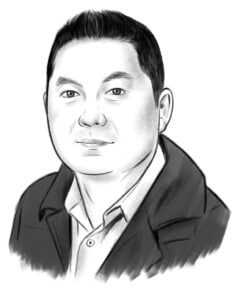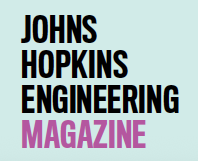Every year, thousands of families in the U.S. wait months—sometimes much longer—for an autism diagnosis for their child. Without that diagnosis, insurance won’t cover vital therapies, and treatment delays can have lifelong consequences.

“It’s the biggest barrier to care,” says Justin Ho, Engr ’00. “You can’t access services if you don’t have the paperwork, and that paperwork is very hard to get.”
Ho decided to change that. In 2021, the Johns Hopkins biomedical engineering graduate founded a telehealth psychology clinic, Jigsaw Diagnostics, which is focused on speeding up autism evaluations for children. The mission was clear: cut monthslong diagnostic wait times to just weeks and make care accessible to more families.
“Without a diagnosis, kids can’t access critical services, and those services can cost up to $70,000 a year without insurance,” he explains. “We’re ending that bottleneck.”
The clinic—which has 12 clinical psychologists on staff—has already served more than 2,500 families and currently sees 130 to 140 new patients each month, most of them referred through insurance companies. “We’re building the kind of system that should have already existed,” he says.
Ho, who moved from Taiwan to New Jersey at age 10, has always wanted to make an impact. “I was interested in health care from the start,” he says. “But I didn’t want to become a doctor. I wanted to use engineering to help more people at scale.”
That mindset drew him to Johns Hopkins. “Biomedical engineering teaches you humility,” he says. “You learn to prioritize, to problem solve, and to focus on what really matters.”
After a stint in consulting and earning an MBA from Duke, Ho gravitated toward roles in health tech, eventually leading product development at an AI startup focused on autism diagnostics. “We had something that was FDA-cleared and could help people, but the system didn’t know how to pay for it,” he explains. “That’s when I realized we had to build something new— something both families and insurers could use.”
“Without a diagnosis, kids can’t access critical services, and those services can cost up to $70,000 a year without insurance,” he explains. “We’re ending that bottleneck.”
— Justin Ho
Today, Jigsaw is growing, expanding into attention deficit hyperactivity disorder (ADHD) and neuropsychological evaluations, and offering limited in-person options for families who need them. He’s also exploring how to bring more AI into the background, automating report writing and workflows while keeping humanity at the heart of care. “Parents don’t want to talk to a chatbot,” says the CEO. “They want a real person to guide them.”
His biggest lesson for aspiring health tech founders? “It’s not enough to have a great idea. You need to get in the weeds to truly understand the system—how billing codes work, what insurers will cover. The unglamorous stuff makes the innovation possible.”
— HEATHER LOWE
illustration by Joe Kimmel

